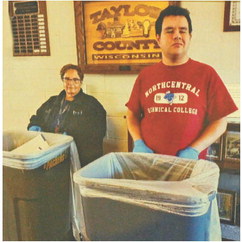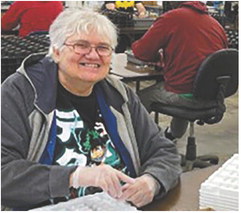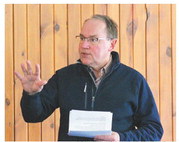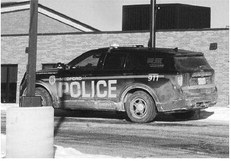individuals with disabilities to be ….


individuals with disabilities to be gainfully employed in the BRI workshop performing very meaningful work while creating relationships. He retired in 2015.
In his early years with BRI he was also instrumental in establishing the Supported Employment programs where individuals with disabilities are placed in employment settings (outside of BRI), with transitional training provided jointly by BRI and the Department of Vocational Rehabilitation.
In the early 1980s Thornton helped BRI roll out its first work crews, providing such services as snow shoveling, cleaning and other custodial services. Again these projects allowed for people with disabilities to earn an income while performing very meaningful and rewarding work.
Up until 1981, BRI was called simply the “Achievement Center.” That year when Thornton and the BRI staff secured its first manufacturing project producing redwood lawn furniture, the organization officially became known as Black River Industries - a name that would be carried and well respected for decades to come.
BRI programs and services continued to grow and in 1987 Paul assisted the organization to move into a building on South Second Street. That facility afforded the opportunity for program growth including commercial kitchen, parking, offices and work rooms and a lawn for the clients to enjoy.
The programs which Thornton helped to establish in the 1970s and beyond remain strong and viable programs today.
Throughout most of his tenure with BRI, he was a “silent leader.” While doing everything from cleaning to driving clients (and nearly all tasks in between), he was the informal “go-to guy” throughout BRI’s many different leadership models.
It was not until spring of 2008 when Paul was officially given the opportunity to formally lead the BRI organization as its director. This was a well deserved, and long overdue, recognition of his years of dedication to the organization.
At the beginning, the Center got most of its clients by referral or request from the Developmental Disabilities unit at Human Services and from “concerned” parents. For many, the TCAC was an alternative to institutionalization.
When Ted Rader moved to Massachusetts in 1977, Catholic Charities Bureau appointed Ron Alexander executive director of the TCAC and the Eastwood Group Home. He had previously been an administrator with the University of Wisconsin Hospitals in Madison. A month after he took over in Medford, the TCAC was moved over to the old IGA grocery building at the corner go Hwy 13 and Perkins Street in Medford.
Over the next three years the center gradually Bev Hamm has worked at BRI for 50 years. She began working with BRI when she graduated high school and with the assistance of BRI she was eventually able to move from her parent’s home to her own independent apartment and continues to live independently with in home support from BRI. She has worked many jobs at BRI and throughout the community in her 50 years. She is most appreciative of the team work and great friends she has at BRI.




